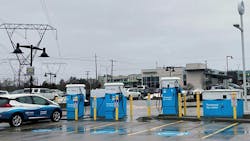BC Hydro Adds 100-kW Fast Charging Sites in Service Territory
British Columbia distribution utility BC Hydro has doubled the number of electric vehicle fast chargers in South Surrey.
Two new 100-kW charging units were installed in the Surrey community located on the Semiahmoo peninsula. BC Hydro originally opened the South Surrey site in 2018 with two 50-kW chargers.
The newer, higher capacity fast chargers can add about 100 kilometers (62 miles) of range to an electric vehicle in about 10 minutes. Worries about range and charging times are two impediments to EV adoption.
"B.C. has one of the largest public electric vehicle charging networks in Canada, but running out of power with no place to charge up, especially on longer trips, can still be a worry for people," said Josie Osborne, Minister of Energy, Mines and Low Carbon Innovation, in a statement. "Together with BC Hydro and other partners we're continuing to expand our public charging network to reduce range anxiety and encourage more drivers to make the switch to an EV powered by B.C.'s clean electricity."
Microgrids can power EV charging stations to ease utility grid challenges
Key content at Microgrid 2024 in Baltimore: April 22-24
Fossil-fueled transportation accounts for about 40% of greenhouse gas emissions in British Columbia, according to some reports. Three years ago, the utility revealed an electrification plan trying to encourage residents and businesses to switch to electrification (powered by hydropower) from fossil fuels.
"This new charge site will help British Columbians get to where they need to go more quickly and reliably, all while using clean energy," said George Heyman, Minister of Environment and Climate Change Strategy. "More electric chargers bring both environmental and economic benefits.”
BC Hydro currently has about 164 units at 85 sites within its service territory. Those chargers are funded in partnership with the Province of BC and Natural Resources Canada.
The utility’s goal is to have 325 charging units at 145 sites by the end of 2025.
Several years ago, the British Columbia provincial government announced greenhouse gas emission reduction targets of about 30 percent for transportation and 60 percent for buildings and communities by 2030, compared to 2007 levels.
In British Columbia’s biggest population center, the Vancouver International Airport has contracted with Schneider Electric to implement numerous decarbonization technologies over the coming decade.
About the Author
Rod Walton, EnergyTech Managing Editor
Managing Editor
For EnergyTech editorial inquiries, please contact Managing Editor Rod Walton at [email protected].
Rod Walton has spent 17 years covering the energy industry as a newspaper and trade journalist. He formerly was energy writer and business editor at the Tulsa World. Later, he spent six years covering the electricity power sector for Pennwell and Clarion Events. He joined Endeavor and EnergyTech in November 2021.
Walton earned his Bachelors degree in journalism from the University of Oklahoma. His career stops include the Moore American, Bartlesville Examiner-Enterprise, Wagoner Tribune and Tulsa World.
EnergyTech is focused on the mission critical and large-scale energy users and their sustainability and resiliency goals. These include the commercial and industrial sectors, as well as the military, universities, data centers and microgrids. The C&I sectors together account for close to 30 percent of greenhouse gas emissions in the U.S.
He was named Managing Editor for Microgrid Knowledge and EnergyTech starting July 1, 2023
Many large-scale energy users such as Fortune 500 companies, and mission-critical users such as military bases, universities, healthcare facilities, public safety and data centers, shifting their energy priorities to reach net-zero carbon goals within the coming decades. These include plans for renewable energy power purchase agreements, but also on-site resiliency projects such as microgrids, combined heat and power, rooftop solar, energy storage, digitalization and building efficiency upgrades.

